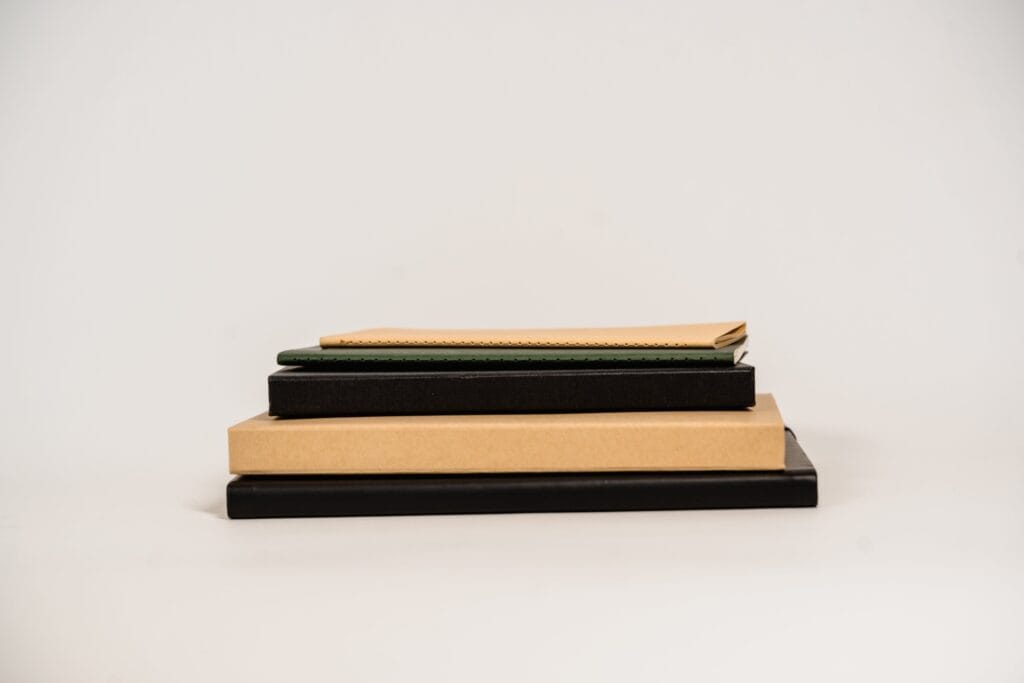Journaling is one of the best habits I’ve developed throughout the short life I’ve lived so far. It took a while to click in, but it has been instrumental to my growth as a person. And it still is as I move forward.
This might sound crazy, but stick with me. Journaling is like having a written conversation with yourself. This conversation has helped me countless times, especially when I had to face some of life’s challenges on my own.
In practice, journaling involves regularly recording your thoughts, feelings, and experiences in a journal or diary. It’s a personal and reflective activity that can take various forms, such as free writing, bullet journaling, or structured prompts.
This practice serves as a mindful pause in today’s fast-paced world, where we’re bombarded with information and constantly on the go. Journaling can bring clarity, emotional release, and a sense of purpose in today’s often hectic and demanding world.
If you want to know more about journaling, keep reading. I’ll share everything I’ve learned so far so you’ll know what it has to offer.
Benefits of Journaling
Emotional Well-being: Stress Relief, Emotional Expression, Improved Mood
Life’s challenges can often feel like a whirlwind, leaving us feeling overwhelmed and stressed. What’s worse is that sometimes we have to face all of this all by ourselves.
Journaling serves as a grounding anchor in this storm. It helps us release the thoughts swirling in our minds. By jotting down our feelings, we create a space to unload the weight we carry, offering a simple yet effective form of stress relief.
Emotional expression also finds a voice through the pages of a journal. Oftentimes, we find it hard to understand how we feel and that can confuse us. We can put this confusion to rest by looking at it from a different perspective.
The act of putting emotions into words helps us make sense of what we feel, untangling the complex web of thoughts in our minds. It’s a process that enables us to confront and process our emotions, leading to a tangible improvement in our overall mood.
Clarity and Self-awareness: Identifying Patterns, Goal Setting, Enhanced Problem-solving
Ever find yourself caught in repetitive cycles of behavior or facing the same challenges repeatedly?
Journaling can help you by providing a unique vantage point. It allows you to step back and identify patterns in your thoughts and actions. This self-reflection is a powerful tool for gaining insights into your behaviors, enabling you to break free from unproductive cycles.
Setting and tracking goals also becomes more attainable when you put them on paper. Journaling transforms vague aspirations into concrete plans, providing a roadmap for personal growth.
The process of regularly revisiting your goals fosters accountability and motivation, propelling you forward with a clear sense of purpose. This is my favorite aspect because it has led to where I am today.
Enhanced problem-solving is another unexpected yet welcomed side effect of consistent journaling.
By expressing your thoughts on paper, you create a space to analyze challenges objectively. This newfound perspective often unveils innovative solutions, turning obstacles into opportunities for growth.
Our brains are made to create ideas, not store information. You’ll be surprised how most solutions are right in front of you once you’ve written the problem down.
Types of Journals
Journaling is a simple yet powerful tool, and it takes on many forms. Each type serves a unique purpose in helping us navigate our sea of thoughts. This is where I almost got lost because it took some time to finally find what worked for me.
Personal Journals
Daily Reflections
A classic method of journaling is a daily reflection journal. It’s your personal space to jot down thoughts, events, or even the mundane moments that made your day. No need for fancy words—just a quick snapshot of your daily experiences. This journal is perfect if you love looking back on what you’ve done and want to know how to improve at what you do.
Gratitude Journals:
Ever heard of counting your blessings? That’s exactly what a gratitude journal is all about. It’s a straightforward way to acknowledge and appreciate the positive aspects of your life.
This type is great for making sure you don’t take things for granted. It might even attract more positivity in your life. Just jot down a few things you’re thankful for each day, whether big or small.
Dream Journals:
Dreams can be elusive, slipping away like sand through your fingers. A dream journal helps you capture those fleeting moments.
This is a fun type of journal for those of you who have bizarre dreams or amazing ideas coming from those dreams. Keep it by your bedside, and as soon as you wake up, scribble down whatever fragments of your dream linger in your mind.
Specific Focus Journals
Travel Journals:
If you’re a wanderer at heart, a travel journal is your trusty companion. Capture your memories by recording the places you’ve been, the people you’ve met, and the experiences that left an impression. It’s like a snapshot of your adventures on paper.
This is a journal I’d love to do more in the future. I never got the chance to travel a lot and I’m making the best of it when I finally do.
Fitness Journals:
Whether you’re a gym enthusiast or a casual jogger, a fitness journal can be a valuable tool. Log your workouts, track your progress, and note how you feel after each session.
This journal is also very helpful when you have trouble with achieving your fitness goals. It’s a no-nonsense way to stay accountable and motivated on your fitness journey.
Creative Writing Journals:
Unleash your creativity in a dedicated writing journal. No need to worry about perfect grammar or polished sentences—just let your thoughts flow.
Use it to draft stories, jot down snippets of dialogue, or explore new ideas without any pressure. Or, if you’re like me, you can create drawings instead of writing down words!
Many More Types Of Journals Out There
Each type of journal serves a specific purpose, providing a snapshot of different aspects of our lives. Whether it’s the simplicity of daily reflections or the focus of a travel or fitness journal, find the style that resonates with you. The key is to keep it straightforward, honest, and true to yourself.
Getting Started with Journaling
If you’ve ever thought about journaling but didn’t know where to begin, you’re not alone. When I started out journaling, I wondered what journal to use, how often to do it, and where to keep it among many thoughts. I got stuck until I finally decided to just do it and write in a random notebook.
Starting a journal can be an easy and fulfilling practice if you just approach it with a straightforward mindset. Let’s break it down into three simple steps for now.
1. Choosing the Right Journal
Digital vs. Physical
First things first, decide whether you want a digital or physical journal. Digital journals are on your device, while physical ones are the good old pen-and-paper kind.
If you’re tech-savvy, a digital journal on your phone or computer might be convenient. And if you’re a fast typer, you can use it to your advantage. Typing words quickly in succession allows you to record your thoughts in real-time, which is often impossible with handwriting.
But if you prefer the tactile feel of a notebook, go for the physical option. By writing it down by hand, you can also take things slowly and process your thoughts at a pace. This method even allows you to curate your thoughts instead of just writing everything down.
Lined vs. Blank Pages
Next, consider the pages. Lined pages are excellent if you like structure and want your words neatly aligned. But if you’re more of a free spirit, go for blank pages. They offer flexibility, letting your thoughts flow without any boundaries.
2. Setting the Mood
Choosing a Quiet Space
It’s easy to fall into the trap of thinking as long as you have your journal and pen, you can journal everywhere. If you don’t give yourself a quiet space to let journaling do its magic, not only will you have to wrestle with the noise inside your head, but also the noise around you.
Instead, find a quiet spot where you won’t be disturbed. It could be a cozy corner in your room, a park bench, or even a coffee shop. If you like the white noise then that’s good. Otherwise, you use a pair of headsets so you can be in your own world.
The key is to create an environment where you can focus and let your thoughts flow without interruptions.
Selecting the Right Time
Next is to pick a time that suits you. Whether it’s early morning with a cup of coffee, during lunch break, or before bed, choose a time when you’re naturally more relaxed.
We’re trying to build a healthy habit here so consistency is essential. Find a time slot that you can stick to every day if you can.
3. Establishing a Routine
Consistency is Key
Remember, journaling works best when it becomes a habit. Aim to write every day, even if it’s just a few sentences. Consistency helps you track your thoughts and experiences over time, creating a meaningful record of your life.
Overcoming Writer’s Block
Writer’s block is normal, but don’t let it discourage you. If you’re stuck, start by writing about your day, your feelings, or even what’s around you. The act of putting pen to paper often kickstarts the flow of thoughts.
This is Just the Beginning
By following these simple steps, you can embark on a rewarding journaling journey. It’s a practice that becomes a valuable companion as you navigate your thoughts and experiences throughout your life.
Prompts and Techniques
Whether you’re navigating the twists and turns of life or simply looking to gain a deeper understanding of yourself, incorporating writing prompts and artistic techniques into your journaling routine can be a game-changer.
Journaling Prompts for Self-discovery
1. Reflecting on Past Experiences
Sometimes, the key to understanding yourself lies in your past. Kickstart your journaling journey by reflecting on past experiences. Identify what worked and what didn’t.
What were the highs and lows? What did you learn? Write it down. This simple act of introspection can provide clarity and help you connect the dots of your life story.
2. Exploring Personal Values
Your values are the compass that guides your decisions. Take a moment to explore and jot down your personal values.
What matters most to you? What principles do you live by? Understanding your values can bring a sense of purpose to your life, helping you align your actions with what truly matters.
3. Visualizing Future Goals
The future is a blank canvas waiting for your dreams to unfold. Use your journal to visualize your future goals, create a plan, and execute them.
Where do you see yourself in a year, five years, or even a decade? Write down your aspirations and create a roadmap to turn them into reality. This exercise can ignite motivation and give you a clear direction forward.
Artistic Techniques to Amp Up Your Journaling:
4. Sketching and Doodling
Sometimes words aren’t enough to express what’s on your mind. Embrace the power of visuals by incorporating sketching and doodling into your journal. It doesn’t have to be a masterpiece; even simple drawings can convey emotions and thoughts that words may struggle to capture.
5. Collage Journaling
Scissors, magazines, and glue – welcome to the world of collage journaling. Create a visual representation of your thoughts by piecing together images and words that resonate with you. It’s a tactile and creative way to explore your inner world, allowing you to express yourself beyond the confines of sentences.
6. Incorporating Photos
A picture is worth a thousand words. Print out snapshots that hold meaning for you and glue them into your journal. These visual cues can transport you back to specific moments, evoking emotions and enriching your reflective process. Your journal becomes a visual time capsule of your life.
Journaling is a journey of self-discovery, and these prompts and techniques are your companions on this adventure. Just remember, there’s no right or wrong way to journal. It’s a personal experience tailored to you.
So, grab your pen, open a fresh page, and let the words and images flow. Your journal is a canvas – paint it with the colors of your thoughts and feelings.
Overcoming Common Challenges
We’re not perfect and the world will also try its best to remind us of that. Here are some journaling challenges and what you can do about them.
1. Lack of Time
Journaling doesn’t have to be a time-consuming affair. Quick journaling exercises can be your best friend. Instead of trying to write a novel, jot down a few key thoughts or a summary of your day. Think snippets, not sagas.
Another nifty trick is to weave journaling into your daily routine. It doesn’t have to be a standalone activity. Maybe scribble a few lines during your coffee break or while waiting for your pasta to boil. Quick and simple, just the way we like it.
2. Fear of Judgment
Ah, the silent critic in our heads that says, “What if someone reads this?” It’s a scary thought but it doesn’t have to be.
Your journal isn’t meant to be a novel masterpiece. It’s meant to be a safe space for your thoughts. Allow yourself to be raw and unfiltered. Remember, you’re not writing for an audience; you’re writing for you.
If the fear of prying eyes really bothers you, then maintain a private journal. Just have a conversation with yourself that no one else will eavesdrop on. Lock it away, both physically and mentally.
Overcoming these common journaling challenges is all about simplicity and self-acceptance. Quick exercises and integrating journaling into your routine can make it a seamless part of your day. Embrace imperfection, and let your journal be a safe haven. Keep it private if you want to, and let your thoughts flow freely without the fear of judgment.
Start Journaling Today!
The benefits of journaling are straightforward and accessible to everyone. It’s a simple yet powerful practice that can significantly impact your emotional well-being and self-awareness.
So, grab a notebook, find a quiet moment, and start reaping the rewards of this uncomplicated yet transformative habit. Your journey to a more balanced and fulfilled life begins with just a few strokes of the pen. Happy Journaling!





Pingback: 7 Easy Types of Journal For Beginners to Try - Marcel Jaudian
Pingback: How to Start Journaling in 7 Simple Steps - Marcel Jaudian